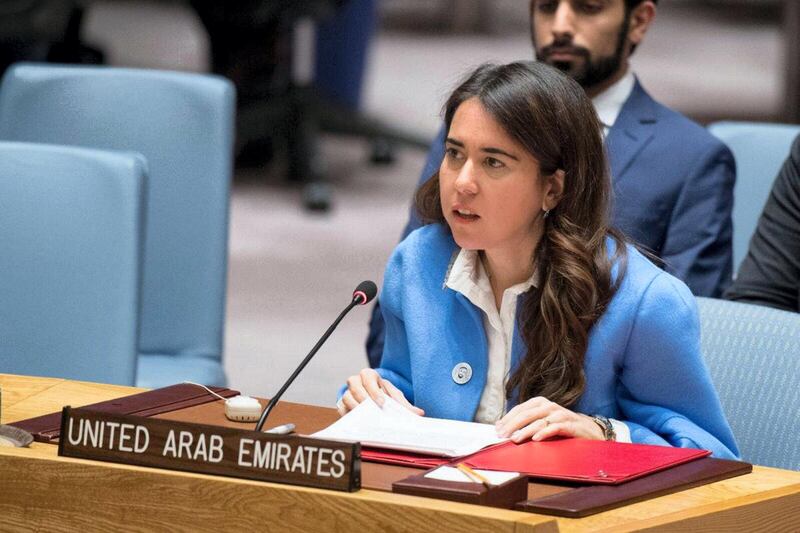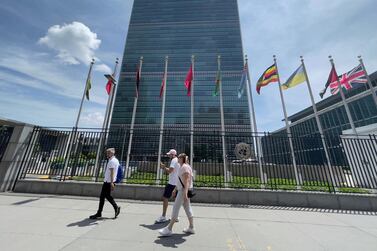The UAE will use its coming seat on the UN Security Council for a broader diplomatic push to reduce regional tension, the country's UN ambassador Lana Nusseibeh said on Thursday.
Ms Nusseibeh spoke with The National before a UN General Assembly vote on Friday that will select five nations to serve on the Security Council for two years, starting next year.
The UAE is running unopposed.
She said the Emirates would use its seat at the world’s top table to push for women’s rights, fight climate change and terrorism, and reduce tension in the region, including building bridges with Iran.
“UAE foreign policy has very much prioritised de-escalation, political diplomacy with Iran and with other regional contexts in the last few years, and I think you're going to see an acceleration of that foreign policy trajectory in the coming period,” Ms Nusseibeh said.
Tomorrow is election day.
— UAE Mission to the UN (@UAEMissionToUN) June 10, 2021
We are grateful for the support of our @UN community as we strive to advance inclusion, spur innovation, secure peace, & build resilience.
Be sure to follow us on Twitter & Instagram for election day updates. #StrongerUnited #UAExUNSC pic.twitter.com/NFZIaGLWYU
The 193-nation UN General Assembly will vote on which five countries will hold Security Council seats for a two-year term starting on January 1, 2022.
The UAE, Albania and Brazil are all but guaranteed to win seats as they are the only candidates from their regions.
Ghana and Gabon are set to take the two African seats after the Democratic Republic of the Congo withdrew from the race.
Brazil has served on the council 10 times, Gabon and Ghana three times each, and the UAE once, in 1986-1987. Albania has never served on the council.
The UAE’s journey back to the council has been years in the making.
Its candidacy was endorsed by the Arab League in 2012 and by the UN group of Asia-Pacific nations last year.
Candidate nations in uncontested seats still seek high vote tallies on election day and spend months rallying friends and allies.
Ms Nusseibeh called it a “once-in-a-generation opportunity” for the Emirates to “shoulder responsibility on the council for the myriad challenges globally we’re facing”.
The UAE, one of a dwindling number of countries to have good relations with both the US and China, has pitched itself as a mediator in a polarised world where co-operation is badly needed.
#MarkCalendars Security Council Elections take place this Friday: DRCongo, Gabon and Ghana for the African Group, UAE for Asia-Pacific Group, Brazil for GRULAC, Albania for Eastern Europe @CBSNews pic.twitter.com/Fs8b8ROs2C
— Pamela Falk (@PamelaFalk) June 9, 2021
This week’s vote comes amid headline-grabbing initiatives by the UAE, which has in recent months established diplomatic ties with Israel and launched a Mars probe, is hosting the world fair in Dubai in October and is bidding to host major climate talks in 2023.
“It fits the moment of where the UAE is today on the international stage,” Ms Nusseibeh said.
The UAE has moved to newer offices to host its bigger diplomatic mission to the UN in New York.
More than half of the team will be women, Ms Nusseibeh said, including herself and one of her deputies.
The 15-nation council has 10 seats for temporary members but is dominated by its five permanent (P5) members – Russia, China, the US, Britain and France – which hold the power of veto.
The council meets regularly on threats to international peace and security, and makes the ultimate decisions on resolutions imposing international sanctions, authorising use of military force and launching peacekeeping missions.
Its case file includes Syria, Yemen, Libya, Iraq, Lebanon, Ukraine, Ethiopia, North Korea and other hotspots, as well as the decades-old Israeli-Palestinian conflict and Iranian weapons programmes.
To be adopted, council resolutions need at least nine votes in favour and no vetoes from permanent members.
The council is often deadlocked on issues where the permanent members disagree, such as Syria, Myanmar and Ukraine.
It has been criticised for failing to act quickly in a crisis, notably during months of gridlock last year as Covid-19 crossed borders and as the US under president Donald Trump sparred with China over the origins of the pathogen.
Ms Nusseibeh said the UAE would use its networks to push for consensus in the chamber.
"We do have excellent relationships with the P5 members but also the other members who will be on the council with us, and we think that we can use those good relationships to be a part of a constructive conversation," she told The National.
Regionally, the UAE will seek to promote stability, including when it comes to Iran.
As US President Joe Biden has pushed to revive a flagging 2015 nuclear deal with Iran and other world powers, Saudi Arabia and other US allies in the Gulf have sought to engage diplomatically with Tehran.
“With Iran, with other players in the region, what you’ve seen over the last several years is the growth or the deepening of a trust deficit … and I think we have to start building up the credit in the trust levels,” Ms Nusseibeh said.
“We want to live in a prosperous, stable region, and we don’t want to see the region in a state of conflict.”
She said the UAE would take a “measured” approach on the council when dealing with Iran amid talks over reviving the 2015 nuclear deal, under which Tehran agreed to put curbs on its nuclear programme in return for the lifting of international sanctions.
Mr Biden wants to restore the deal, abandoned by his predecessor Mr Trump, despite concerns among Washington’s Arab allies that it did not do enough to deter Iran’s other destabilising activities in the Middle East.
“We are open to hearing about any constructive solution that, yes, curbs Iran’s ballistic missile programme, or any country’s ballistic missile programme; that definitely decreases or ends with accountability any country's funding of external militias around the region,” Ms Nusseibeh said.
The UAE may also use its influence with a new partner, Israel, to help the council address a decades-old agenda item: the dispute between Israelis and Palestinians, she said.
The UAE last year became the first Arab country in many years to formally establish ties with Israel.
The move was criticised by some Palestinians but was described by the UAE as an effort to stop the Israeli annexation of Palestinian land.
“The bilateral relationship … does give us another avenue for influence,” Ms Nusseibeh said. “We cannot be in a continuation of cycles of violence in this conflict.
"There needs to be a two-state solution that ends the conflict, that allows the region to live in peace and prosperity, that brings Israel into the region as a mutually respected partner.”
The UAE was also preparing to push the council to take more action against climate change and terrorism, and to ensure women play a bigger role in peacekeeping missions and are better protected in war zones.
“You cannot look at what is happening around the world, whether it's food insecurity, water scarcity, or countries literally fearing their existence might end because of the impacts of climate, and not have a conversation about it at the top table of peace and security,” Ms Nusseibeh said.








